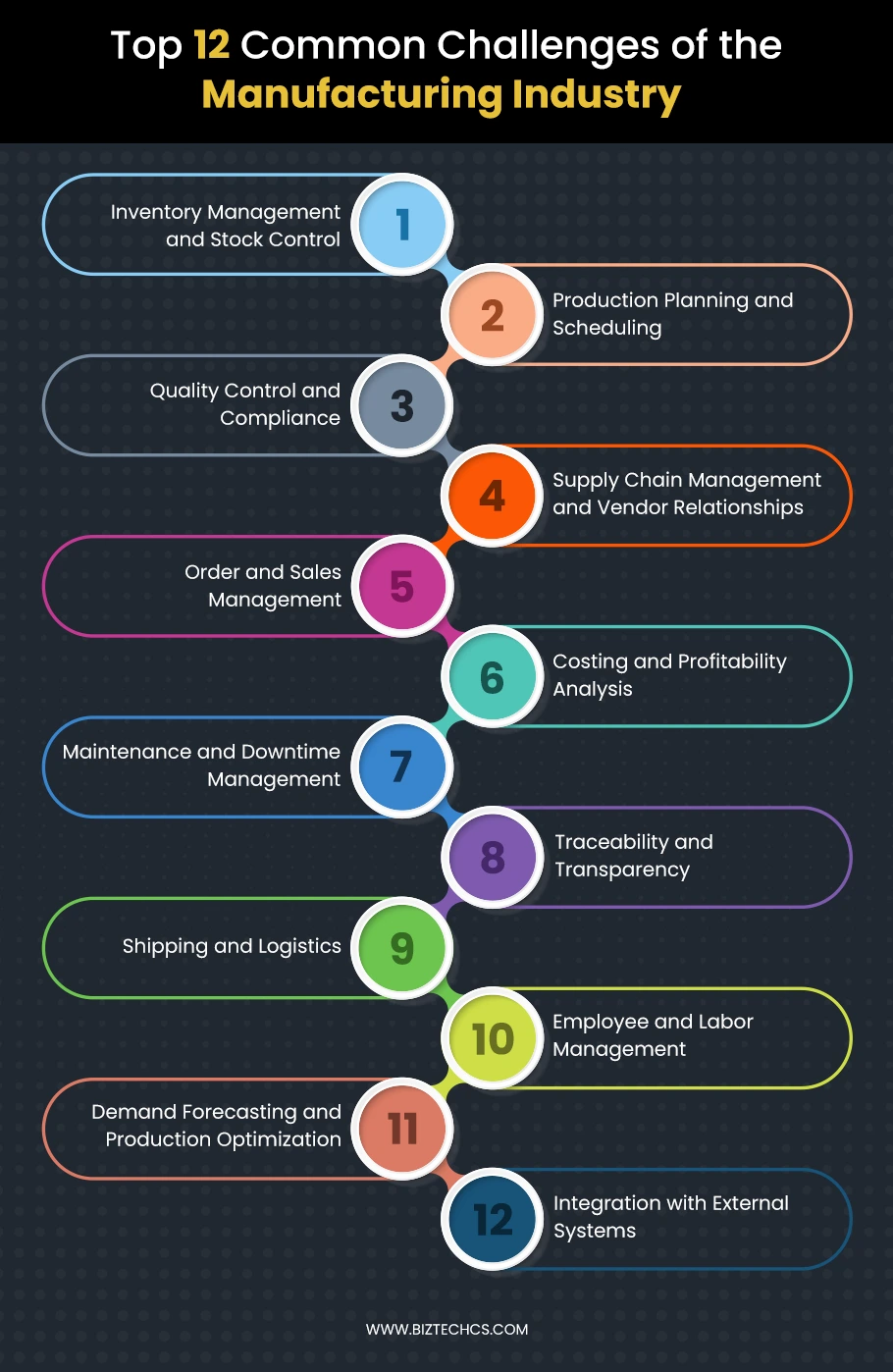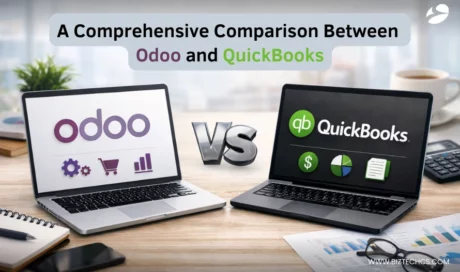2518
How Odoo ERP Solves Top Manufacturing Challenges & Boosts Efficiency
15 min read
2518
15 min read

In 2023, Marco Polo Foodex Srl, a manufacturer of Italian food products, experienced daily delays due to scattered data and disconnected software. Inventory was difficult to track, and the production schedule lacked clear timelines for execution.
This company was similar to 32% of European manufacturers that identify severe regulatory constraints and mutating legislation as major growth barriers (Deloitte). Many avoid outdated tools that do not communicate with each other.
Here is where ERP systems for manufacturing come in. The right solution does not merely work on the task but brings control and clarity every step of the way. Thanks to Odoo ERP software development, companies like Marco Polo Foodex Srl gained operational clarity and improved decision-making.
The Odoo production module then provided them with one platform to integrate production with inventory and order flows. For those searching for a trusted ERP for the manufacturing industry, Odoo presents a viable option backed by results.
Control quickly fades when each department uses a different system. Whereas production relies on spreadsheets, inventory is done via standalone software, and finance is the last rung of coordination.
The result: every opportunity is delayed, with blurred communication and misaligned expectations. However, if everything is handled in an ERP such as Odoo ERP manufacturing with a single point of truth, that’s how manufacturers really regain control without adding another software layer to the mix.
Unless production planning seems like gambling, somewhere things are going wrong. Deadline breaches, idle machines, and wasted materials are all indicators of poor visibility. A proper ERP must align demand, supply, and shop floor schedules in real time.
With the odoo production module, manufacturers get equipped for planning based on facts, not assumptions-leading to fewer surprises and a production floor that simply works.
Being short of raw material in the midst of an order or just sitting on piles of stock that are not needed is a big red flag. These issues waste money and hamper delivery capability. Once detached from production and sales, inventory unravels fast.
An ERP for manufacturing industry connects all parts of the chain, so you never go off track. Real-time stock data means the smartest of planning, hence fewer costly mistakes.
Late delivery once. Wrong order once. These are sometimes how you lose your best client. Such mistakes usually come from disconnected systems. Using ERP systems for manufacturing lets you close the gap between sales, warehouse, and production–ensuring that the customers always get what they expect.
Growing a factory, a team, or a product line is a win until systems cannot keep pace with the necessary growth. Now you will have to hire people to manage the chaos rather than create value. ERP imposes some structure on the growth without being a drag on it.
Therefore, Odoo ERP manufacturing tools ensure that companies scale in bent and not in stress. That is the difference between merely getting through growth and flourishing in it.

Manufacturers face dozens of challenges every day, from inventory tracking to delivery delays. The good news? Smart ERP systems can solve most of them when set up right.
Did You Know?
Manufacturing companies are the top adopters of ERP software, representing 47% of businesses looking to purchase ERP solutions.
Manufacturers mostly have difficulty keeping inventory levels just right. Too much stock means that capital is tied up and the warehouse space is taken away. Too little causes production delays and delays in delivery dates.
Odoo ERP manufacturing solves this with real-time stock tracking at all locations. Odoo production module integrates inventory with sales, purchase, and production, so every movement counts.
Auto-replenishment, batch, or serial number tracking provides further layers of control. For any company considering an ERP for the manufacturing industry, accurate inventory management is one of the most hands-on benefits.
Did You Know?
91% of companies with ERP systems report optimized inventory levels, leading to reduced carrying costs and improved order fulfillment.
Poor planning is where all delays in production start. Machines sit idle while the crews wait for materials. Shifts are rescheduled at the very last moment, and no one gets to see the entire schedule clearly.
These are among the very typical problems manufacturers encounter when they operate in a manual setup or dispersed environment. Setting the production schedule in Odoo ERP manufacturing is paramount, with routing and work orders providing details.
The system integrates Bills of Materials (BOMs) with inventory and HR modules to link all resources together. The odoo production module tracks progress in real time, giving teams the opportunity to adapt before minor situations snowball.
For companies choosing manufacturing erp solutions, having a clear schedule and maximum visibility is an absolute necessity.
Manufacturers work day and night to achieve consistent quality in every single batch. A single defect can either halt production or bring about expensive recalls.
Another pressure is imposed on them with regulations to be observed. If checks are not put in place to monitor these areas, they become unnoticed.
Odoo ERP manufacturing allows quality control to be found at every step, from raw materials to finished goods. It allows inspections to be carried out while manufacturing is in progress and tied directly to reports for traceability.
It further assists in monitoring compliance by recording results and signaling noncompliance at the earliest. For any business serious about quality, the ERP for manufacturing industry must have this level of control and visibility.
Supply chain gaps tend to start with poor supplier response times or missed orders. Procurement departments fail to handle price fluctuations, delivery slack, and dispersed vendor information.
Such problems can slow down production and raise costs. With Odoo ERP manufacturing, procurement is integrated into inventory and accounts, keeping data in sync. The system monitors supplier performance and reorders automatically when stock reaches set thresholds.
RFQ tools facilitate easy comparison of suppliers and the selection of the best cost option. This introduces transparency in vendor choice and enhances long-term vendor relations.
For companies looking for good manufacturing ERP solutions, supply and cost management from one location is a significant benefit.
Order errors and delayed delivery are usual areas of pain in manufacturing. Quotes are usually sent by sales teams without being aware of what’s actually available in stock. Production begins without definite schedules, and customers are left in limbo.
These delays typically result from systems of disconnected sales, inventory, and production management. With Odoo ERP manufacturing, all the order flow is linked—from quote to delivery.
The system creates orders automatically, looks for stock, and creates a production alert if necessary. CRM functions assist in monitoring customer history and follow-up on new prospects.
For businesses in search of solid manufacturing ERP software, this kind of coordination ensures orders are correct and customers are happy.
It is common for many manufacturers not to know where their money goes. Material costs vary, labor hours are difficult to monitor, and indirect costs tend to escape notice. With no complete cost visibility, price decisions are perilous.
Odoo addresses this with comprehensive tracking in both its Manufacturing and Accounting modules. Direct and indirect costs are recorded in real time, such as raw materials, labor, and overheads. The system also offers profitability reports by line, product, or project. This delivers the kind of clarity that classical decision-makers require to manage margins.
For firms committed to being competitive, an excellent ERP for manufacturing industry should be capable of supporting such financial intelligence.
Unplanned breakdowns of equipment can halt production abruptly. Every hour lost translates into missed deadlines and additional costs. Most manufacturers continue to use reactive repairs rather than scheduling maintenance.
It results in repeated breakdowns and no history of prior faults. Odoo ERP manufacturing allows scheduled preventive maintenance and easy tracking. The system directly connects with the odoo production module, so repairs and downtime are tracked and on display.
Alerts inform teams prior to when machines require maintenance, minimizing last-minute downtime. Maintenance control is essential to ensuring steady and consistent production for any business venturing into manufacturing ERP solutions.
Tracing each step of production is a continuous problem for manufacturers under strict compliance regulations. Missing batch information or incomplete records result in fines or failed audit situations.
Quality teams spend hours reconciling data from various sources. Odoo erp manufacturing makes this easier by connecting raw materials, production processes, and finished products in a single system. Each product is traced using batch or serial numbers along the entire process.
Quality tests are recorded in real time and linked to production information. Regulatory reporting is created in a short time, with no human intervention. For those businesses requiring complete visibility, the ERP manufacturing industry must provide traceability with no holes.
Shipping tends to get convoluted when the orders accumulate in various carriers and locations. Prices differ, stickers take time, and the tracking information is difficult to deal with. It causes late deliveries and irritated clients.
Producers managing multiple suppliers require something that makes it all work on a single platform. Odoo ERP manufacturing integrates directly with third-party carriers such as FedEx and UPS. It streamlines label generation, shipment tracking, and cost updates in real-time.
Delivery routes can be optimized, and customers are kept updated with live updates. For those who invest in manufacturing ERP solutions, seamless logistics isn’t a perk—it’s the center of customer happiness.
Labor hours tracking on paper or across spreadsheets tend to lead to errors. Missed punches, incorrect shift data, and past-due payroll can be stressful on the shop floor. Small errors in scheduling can affect production for big teams.
Odoo erp manufacturing provides an unmistakable solution by integrating attendance, payroll, and manufacturing in one platform. Managers can monitor work hours in real-time and correlate them with production jobs.
The system also determines labor costs and updates them in every job order. With intelligent scheduling solutions, staff are allocated according to real demand.
For those makers that require dependable ERP for manufacturing business, matching labor with production is a pragmatic reality, not an administrative chore.
Creating too many results in excess and creating too few results in missed sales. Most makers find it challenging to achieve the right equilibrium. Demand changes rapidly, and manual planning cannot constantly keep pace.
Odoo ERP manufacturing employs historical sales data to predict demand more precisely. It streamlines procurement automatically to keep pace with what’s required on the shop floor.
The odoo production module also assists in planning output without waste, minimizing idle time, and resource utilization. When others look into manufacturing ERP solutions, demand forecasting is not merely about figures—it’s about safeguarding margins and fulfilling market requirements.
Most manufacturers use a combination of homegrown tools that took years to create—one to design, one to finance, and another for manufacturing. They don’t communicate with each other, creating delays and mismatches in data.
People waste time entering duplicate information in different places. Mistakes seep in, slowing down decision-making.
Odoo ERP manufacturing addresses this by providing an open platform that integrates well with other software. Integration is seamless and adaptable, whether a PLM system or an outside accounting program.
The Odoo production module even integrates with older legacy systems that are still in operation. For businesses opting for an ERP for the manufacturing sector, such connectivity translates into fewer obstacles and enhanced collaboration.
A mid-range manufacturing customer once contended with expensive software and underutilized ERP functionalities. When they transitioned to Odoo, they just paid for the modules they used. This allowed them to reduce costs without sacrificing functionality. With Odoo, manufacturers can manage costs while receiving the necessary tools.
Their previous system was cumbersome and bogged down operations. Odoo’s interface was intuitive, simple, and easy to adopt by their staff. In a matter of weeks, everyone from the floor supervisor to the scheduler was using it without needing constant support. This seamless learning curve kept production going without any hiccup.
When they expanded product offerings and locations, their software did not slow them down. Odoo grew seamlessly with their business. No reinstallation, no systems overhaul—only module updates when they were needed. This adaptability accommodated their long-term objectives without ongoing IT involvement.
Their manufacturing process contained special steps that typical ERPs could not accommodate. With Odoo, they adapted workflows and screens to fit the way their factory operated. It didn’t involve workarounds or expensive third-party software. The system accommodated them, not vice versa.
Before Odoo, the departments were isolated from one another. Inventory, production, and sales were not synchronized. When they shifted to Odoo, everything linked up. Odoo’s production module gave them visibility through all operations without manual handoffs and delays.
Their technical staff enjoyed being able to see the code. When minor modifications were required, they did not have to wait weeks for a vendor fix. They updated it themselves quickly, saving time and money. This transparency is something that most manufacturing ERP solutions lack.
Did You Know?
Odoo has achieved a consistent annual growth rate of 40%, with projections to exceed €650 million in billings within the next 12 months.
Odoo ERP provides an unparalleled solution to manufacturers’ most significant challenges: production scheduling, resource planning, inventory management, and coordinating supplies. With its modularity, affordability, scalability, and ease of use, Odoo allows manufacturers to streamline their operations, eliminate inefficiencies, and achieve growth.
Installing an ERP system—whether for production planning or general operational management—calls for the appropriate expertise and a reliable partner. This is where BiztechCS comes in.
Installing an ERP system—whether for production planning or general operational management—calls for the appropriate expertise and a reliable partner. This is where BiztechCS is in.
At BiztechCS, we have the expertise in delivering customized Odoo ERP solutions, offering tailored Odoo customization services that cater to the specific requirements of your business. Here’s why you can depend on us as your Odoo ERP implementation partner:
All product and company names are trademarks™, registered® or copyright© trademarks of their respective holders. Use of them does not imply any affiliation with or endorsement by them.

Odoo
116
By Uttam Jain

Artificial Intelligence (AI)
234
By Nandeep Barochiya

Odoo
129
By Uttam Jain